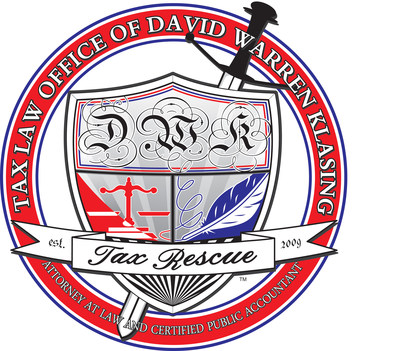
Cision PR Newswire
From the Tax Law Offices of David W. Klasing - First Pure Tax Crypto Tax Evasion Prosecution in the U.S.: A Cautionary Precedent

IRVINE, Calif., Jan. 9, 2025 /PRNewswire/ -- In a landmark enforcement action, the Internal Revenue Service (IRS) and the U.S. Department of Justice (DOJ) recently secured what is essentially the first criminal tax evasion conviction exclusively centered on cryptocurrency. The defendant, Frank Richard Ahlgren III of Austin, Texas, was sentenced to two years in federal prison and ordered to pay over one million dollars in restitution for willfully underreporting gains from selling approximately four million dollars worth of Bitcoin. Ahlgren—who began purchasing Bitcoin in 2011—allegedly inflated his cost basis to reduce his taxable income, withheld substantial portions of his Bitcoin proceeds from his 2017 tax return, and then failed to report an additional six hundred and fifty thousand dollars in Bitcoin sales over the following two years. Acting Special Agent in Charge Lucy Tan of IRS Criminal Investigation's Houston Field Office underscored that this is the first purely tax-focused crypto prosecution, sending a clear signal that digital-asset tax infractions—absent other criminal factors like money laundering—can still trigger life-altering ramifications and incarceration.
This case highlights how many taxpayers in the cryptocurrency arena tend not to be risk-averse, often underestimating the potentially catastrophic consequences of a clandestine IRS criminal tax investigation. When the sole alleged offense is criminal tax noncompliance, the government's readiness to seek prison time should serve as a sobering reminder that swift and deliberate damage control is critical whenever an IRS criminal tax investigation or high-risk audit (such as eggshell or reverse eggshell audit) may be on the horizon.
The Roger Keith Ver Indictment: "Bitcoin Jesus" Faces Tax Evasion Allegations
While Ahlgren's prosecution demonstrates the government's willingness to levy criminal tax penalties for purely tax-based crypto misconduct, another significant enforcement action broadens the scope even further. Roger Keith Ver, known worldwide as "Bitcoin Jesus" for his early Bitcoin advocacy, faces an eight-count federal indictment in the Central District of California—including criminal tax charges of mail fraud, tax evasion, and subscribing to false tax returns. Prosecutors allege that Ver renounced his U.S. citizenship yet failed to satisfy the so-called "exit tax" on his personal and corporate-held Bitcoin—collectively over one hundred and thirty-one thousand coins worth hundreds of millions of dollars by late 2017. By purportedly concealing the actual extent of these positions—particularly within his companies MemoryDealers.com Inc. and Agilestar.com Inc.—Ver is alleged to have caused a forty-eight million dollar tax loss to the United States.
Arrested in Spain, Ver now faces potential extradition to stand trial in the U.S. If convicted, he could receive up to twenty years per mail fraud count, five years for each tax evasion charge, and three years for each false return offense. Although Ver remains presumed innocent unless proven guilty beyond a reasonable doubt, his case illuminates how expatriation or foreign citizenship does not necessarily insulate individuals from federal taxing authorities—particularly if their income streams or business entities remain U.S.-connected. Consequently, this indictment foreshadows covert IRS investigative procedures that can reach far beyond America's borders to apprehend individuals suspected of egregious tax violations.
John Doe Summonses and High-Risk Letters: The IRS Casts a Wider Net
Bolstered by these high-profile investigations and prosecutions, the IRS and DOJ have made it abundantly clear that "more is coming." A key tactic now involves John Doe Summonses, which compel major cryptocurrency exchanges—such as SFOX, Kraken, and previously Coinbase—to disclose user data on anyone transacting above certain thresholds (sometimes as low as twenty thousand dollars over multiple years). By obtaining sweeping records, federal investigators aim to pinpoint taxpayers who may have significantly underreported their digital asset gains. Courts have shown a willingness to authorize such broad-scope summonses, giving the IRS a powerful tool to identify cryptocurrency trades once considered untraceable.
Simultaneously, the IRS has been issuing "high-risk" letters to taxpayers believed to have underreported large or frequent cryptocurrency transactions. Many of these letters arise from Operation Hidden Treasure, a specialized initiative combining the civil and criminal divisions of the IRS to ferret out crypto-based tax fraud. Officials now leverage sophisticated blockchain analytics, exposing individuals who rely on mixers, private wallets, or structured sub–ten-thousand-dollar transfers to evade detection by the IRS. While some crypto users once believed anonymity was achievable, the government's escalating capabilities show that attempting to hide digital profits can carry potentially catastrophic civil and criminal tax repercussions.
Implications for Cryptocurrency Investors
Both Ahlgren's conviction and Ver's ongoing indictment paint a stark picture of the rigorous enforcement posture the IRS and DOJ have assumed. In Ahlgren's case, illegally inflating BTC purchase prices resulted in substantial federal prison time, even absent any narcotics or money-laundering allegations. Ver's indictment reinforces the point that renouncing U.S. citizenship does not absolve individuals from significant tax liabilities, especially when they maintain active business interests or real property in the United States.
By pairing these prosecutions with aggressive John Doe Summons campaigns and "high-risk" letters, the government conveys one consistent message: cryptocurrency is no longer the lightly regulated frontier it once appeared to be. Federal authorities possess the legal and technological apparatus to uncover undisclosed digital-asset trades, pursue back taxes, and elevate civil audits to exponentially severe criminal tax investigations, especially if you have deliberately cheated on your tax returns. For those tempted to rely on pseudonymous accounts or foreign exchanges, the Ahlgren and Ver cases underscore the IRS's escalating enforcement efforts, capable of penetrating multiple layers of financial concealment to uncover hidden cryptocurrency transactions.
Get Back into Tax Compliance without Facing Criminal Tax Prosecution with our dual licensed Voluntary Disclosure Attorneys and CPAs
The overarching lesson is that cryptocurrency tax compliance is a high-stakes affair with potentially life-altering ramifications for those who fail to act. If you are worried about the accuracy of your prior crypto filings or sense that an investigation may already be underway, swift and deliberate engagement with seasoned counsel is essential to achieving damage control and minimizing the risk of an even graver outcome.
Taxpayers who suspect they may have misreported or wholly failed to report cryptocurrency income are well-advised to act quickly—before receiving a subpoena, a John Doe Summons notice, or a "high-risk" IRS letter. Voluntarily coming forward—through a formal voluntary disclosure or carefully amending returns under the guidance of a seasoned dual licensed Bitcoin and other cryptocurrency tax attorney and CPA—can mitigate both civil and criminal tax penalties. By contrast, waiting for an IRS-initiated tax audit often triggers more significant fines, lengthier investigations, and, as the Ahlgren case shows, the prospect of federal criminal tax prosecution and subsequent incarceration.
Note: As long as a taxpayer that has willfully committed tax crimes (potentially including non-filed foreign information returns or undisclosed cryptocurrency income coupled with affirmative evasion of U.S. income tax on offshore income) self-reports the tax fraud (including a pattern of non-filed returns) through a domestic or offshore voluntary disclosure before the IRS has started an audit or criminal tax investigation/prosecution, the taxpayer can ordinarily be successfully brought back into tax compliance and receive a nearly guaranteed pass on criminal tax prosecution and often receive a break on the civil penalties that would otherwise apply.
In light of the 2024 revisions to the IRS Voluntary Disclosure Program, taxpayers should be aware that Form 14457 now mandates a two-step preclearance and disclosure process, requires taxpayers to sign under penalties of perjury, and forces them to affirmatively admit willfulness—in essence, providing the government with a "written confession." The current practice now also demands a six-year disclosure period in most income tax cases, mandates a civil examination, which can include a potentially confrontational interview, and eliminates the direct ability to request administrative appeals once you enter the VDP. Under these tightened guidelines, taxpayers generally must pay all taxes, interest, and penalties in full (or via an installment plan), as the new VDP all but rules out Offers in Compromise or partial pay agreements. Declining to cooperate with the examiner, attempting to challenge penalty determinations, or failing to follow the revised procedures can lead to removal from the program—which in turn exposes taxpayers to the very criminal tax prosecution they hoped to avoid.
It would be wise to hire an experienced and reputable criminal tax defense attorney to take you through the voluntary disclosure process. Only an Attorney has the Attorney-Client Privilege and Work Product Privileges that will prevent the very professional that you hire from being potentially forced to become a witness against you—particularly where they prepared the returns that need to be amended—in a subsequent criminal tax audit, investigation, or prosecution.
Moreover, only an Attorney can enter you into a voluntary disclosure without engaging in the unauthorized practice of law (a crime in itself). Only an Attorney trained in Criminal Tax Defense fully understands the risks and rewards involved in voluntary disclosures—particularly under this new, more demanding framework—and how to protect you if you do not qualify for a voluntary disclosure or if your case becomes contentious during the examination phase.
As uniquely qualified and extensively experienced Criminal Tax Defense Tax Attorneys & Kovel CPAs, the tax law offices of David W. Klasing provides a one-stop shop to efficiently achieve optimal and predictable results that simultaneously protect your liberty and your net worth. See our Testimonials to see what our clients have to say about us!
Whether you're dealing with Bitcoin, Ethereum, Litecoin, or any other virtual currency, call us the tax law offices of David W. Klasing today at (800) 681-1295 or schedule a reduced-rate initial consultation here, and we will successfully guide you through the record-keeping and reporting procedures required to file a tax return. We will also fight vigorously for those the IRS has accused of failing to report and help them stave off more severe civil and criminal tax penalties. Read our story "Tax Fraud is Going Virtual" to know more about virtual tax evasion.
Here is a link to our YouTube channel: click here!
See our Bitcoin and Cryptocurrency Q and A Library
See our Criminal Tax Law Q and A Library
See our Audit Representation Q and A Library
See our Non-Filer Q and A Library
See our Tax Litigation Q and A Library
Public Contact: Dave Klasing Esq. M.S.-Tax CPA, dave@taxesqcpa.net
![]() View original content to download multimedia:https://www.prnewswire.com/news-releases/from-the-tax-law-offices-of-david-w-klasing---first-pure-tax-crypto-tax-evasion-prosecution-in-the-us-a-cautionary-precedent-302346587.html
View original content to download multimedia:https://www.prnewswire.com/news-releases/from-the-tax-law-offices-of-david-w-klasing---first-pure-tax-crypto-tax-evasion-prosecution-in-the-us-a-cautionary-precedent-302346587.html
SOURCE Tax Law Offices of David W. Klasing, PC

NOTE: This content is not written by or endorsed by "WGNO", its advertisers, or Nexstar Media Inc.
